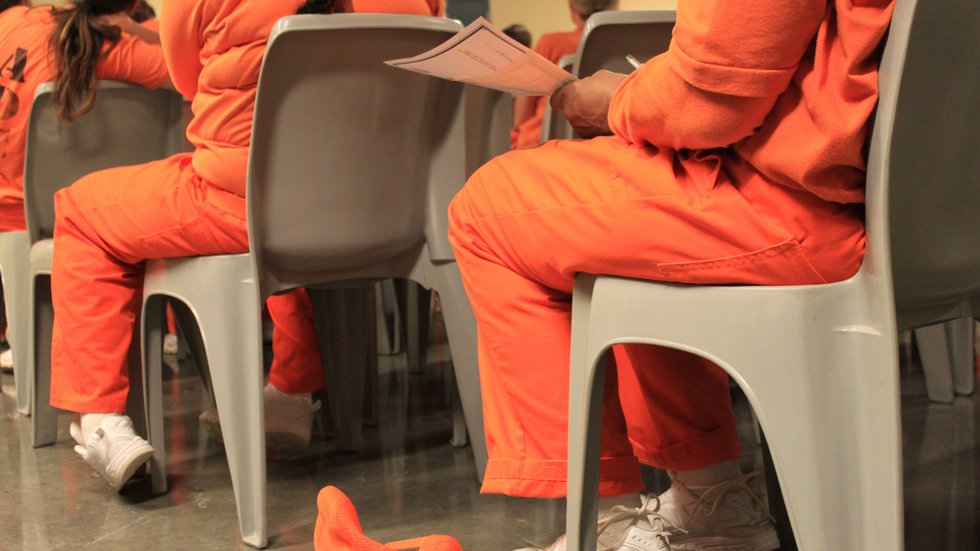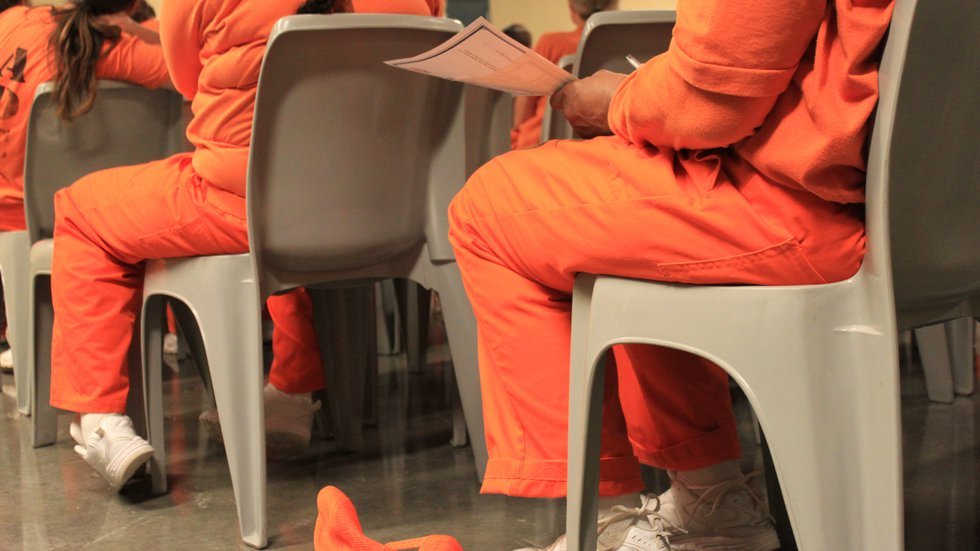
It was in the ninth grade when I, Chris, decided to call it quits. I felt dumb in class never seemed to be able to follow what the teacher was saying. To cover up how behind I was, I’d crack jokes, usually at the teacher’s expense. This would usually wind me up in the principal’s office on my way to another suspension. One day, I got tired of the theatrics and left. It wasn’t long before the juvenile detention center was my second home; and soon after that, the penitentiary.
When I was sentenced to forty-five years in prison for taking another person’s life, I never thought I’d earn a college degree or be successful in any way. I thought all I would ever be is a prisoner whom no one cared about.
I couldn’t have been more wrong.
After a decade in prison, I was introduced to a program that let incarcerated people take college classes for credit. At first, I was too intimidated to join. “What was different?” I thought. “I couldn’t get through school when I was younger, so how could I possibly make it through a college class?”
But one of my friends in the program, Noel, refused to let me sit on the sideline. “What do you have to lose?” he asked. He vowed to stick it out with me and kept that promise.
What I really learned, though, was that I was capable of achieving things I never thought were possible.
Early on, I struggled with math. As an adult, my math skills were comparable to that of a fifth grader. I often felt like our teacher was speaking in an ancient language that no one knew anymore. Most of the time, I’d go right from class to the college office where Noel was a teacher’s assistant and give him the look that said, “We need to talk. You got me into this.”
He’d patiently explain everything, countless times. By the end of my final math class, I received an A for solving a quadratic equation for my final project. What I really learned, though, was that I was capable of achieving things I never thought were possible and that I was a lot smarter than I had ever given myself credit for. All I needed to do was apply myself.
In 2017, I received my associate’s degree. Today, I’m a few credits away from my bachelor’s. And if that wasn’t enough to build my confidence, I’m now a journalist whose work has been published in more than fifty national publications, including The Washington Post, The Boston Globe, Jewish Currents, and The Progressive.
My experience has shown that a little support and the right influence can make anything possible.
Providing educational opportunities to prisoners is the single most effective way to reduce recidivism. When prisoners take some college classes, they are 43 percent less likely to be reincarcerated than those who do not. Prisoners who earn an associate degree are around 85 percent less likely to return to prison, while those who receive a bachelor’s degree are more than 95 percent less likely.
The program Noel and I participated in was University Beyond Bars, a nonprofit created and influenced by incarcerated people in Washington state. It started with a handful of guys taking a class for no credit in 2003. By 2019, there were more than 300 students participating in 1,255 courses.
Through University Beyond Bars, dozens of people have earned college degrees and hundreds have taken college classes. The majority of these students never finished high school. Like me, they initially lacked confidence and often struggled to complete assignments in classes. But, as participants began to develop confidence and self-esteem, we began to see more and more guys in the prison dayrooms—books open, calculators out—studying math and political science.
University Beyond Bars became a hub for fostering the growth of our minds as well as our bodies and souls. It created more than a space to take classes; it created a new way of life behind the prison walls. In addition to the accredited classes, other programs began to emerge.
A debate club was formed. Support groups help encourage personal growth and emotional healing. One of these groups, Achieving Peace, teaches techniques for conflict resolution and another, Alliance, supports the LGBTQ+ community. Also, vocational preparation classes on topics like wastewater treatment, organic vegetable gardening, and digital and financial literacy were created, many by prisoners themselves.
University Beyond Bars became a hub for fostering the growth of our minds as well as our bodies and souls.
Maybe even more important was the social change that University Beyond Bars catalyzed. It’s not uncommon now to walk into a study hall on a Saturday morning and see someone with white supremacist tattoos sitting with a leader of the Black Prisoners Caucus talking about course materials. In classes, students of all identities and political and social beliefs participated in lively discussions, refusing to let their past bad acts control who they now were: open-minded students willing to learn.
This is what education can do: break down lifelong barriers and open doors for new ways of thinking. Many of us here have never experienced this before, given that we often come from small, tight-knit communities from which we never ventured far.
After seeing the amazing potential and results of those who participated in University Beyond Bars, all we could think was, “Why isn’t this happening everywhere in prisons?” If educating prisoners can have such a profound impact on public safety as well as positively influencing the climate inside of prisons, why do so few prisoners have access to postsecondary education?
According to a 2016 report by the Prisons Studies Project, only 6 percent of incarcerated people have access to higher education in prison.
When compared to the overall cost of incarcerating an individual, providing an education behind bars is inexpensive. Washington state’s Department of Corrections, for example, spends as much as $46,000 per incarcerated person annually, while an organization like University Beyond Bars can provide an opportunity to earn an associate degree for less than $8,000. With education reducing recidivism by 70 percent for those who get a degree, it’s clearly more cost-effective to educate than it is to reincarcerate.
Moreover, incarcerated persons who earn a college degree are much more likely to earn a living wage upon release and be able to contribute to the economies to which they return.
The current outlook for those leaving prison is bleak. According to a report by the Brookings Institution, almost half of all former prisoners have no reported earnings in the first year after leaving prison. Of those who do find employment, half earn about $10,000 annually. Exiting prison with a college degree can greatly improve the chances for economic success.
One of the main reasons that educating prisoners is not as popular as it should be is that we have moved from a rehabilitative system to a punitive system. In the 1980s and 1990s, a “tough on crime” narrative swept the nation. Laws were passed to make sentences longer, remove funding for education and rehabilitation programs, and ensure that prisoners served nearly all of their inflated sentences. This created and fed the prison industrial complex while tearing lives apart.
But education programs go against the tough on crime narrative and have a positive impact on both prisoners and those who interact with them. Thankfully, the narrative is slowly changing. There’s a growing understanding that many of the so-called “tough on crime” laws disproportionately targeted people of color in impoverished communities.
There’s also hard data to show that educational and other proactive programs actually work. We know about prisons in other countries like Germany and Norway that, instead of simply warehousing their prisoners, treat them like citizens and help them correct the issues, addictions, and behaviors that led them to being incarcerated in the first place. Because of this, they have extremely low recidivism rates.
The U.S. Department of Education announced last July that it will expand funding for Second Chance Pell grants. The scholarship, which was launched in 2015 under the Obama administration, has funded the education of over 22,000 incarcerated people.
For the more than two million people currently incarcerated and the roughly ten million people under correctional control, the pendulum is swinging much too slowly, but it is undeniably swinging. Increasing educational opportunities have already been shown to be a proven pathway to freedom and public safety.
As a co-founder of University Beyond Bars always says, “When you learn, you don’t return.”

Felecia Phillips Ollie DD (h.c.) is the inspiring leader and founder of The Equality Network LLC (TEN). With a background in coaching, travel, and a career in news, Felecia brings a unique perspective to promoting diversity and inclusion. Holding a Bachelor’s Degree in English/Communications, she is passionate about creating a more inclusive future. From graduating from Mississippi Valley State University to leading initiatives like the Washington State Department of Ecology’s Equal Employment Opportunity Program, Felecia is dedicated to making a positive impact. Join her journey on our blog as she shares insights and leads the charge for equity through The Equality Network.




